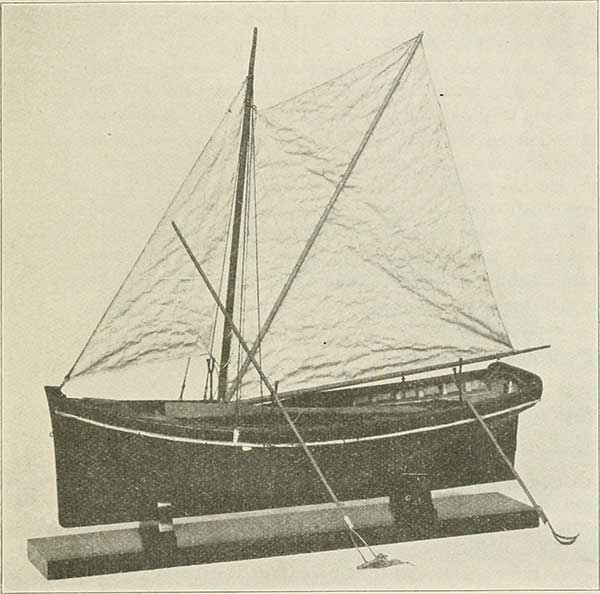A rake’s etymological progress to hell
Three English words sound as rake: the garden instrument, the profligate, and a sailing term meaning “inclination from the perpendicular.” Though at first sight, they do not seem to be connected, I’ll try to show that their histories perhaps intertwine.
OUPblog - Academic insights for the thinking world.

A rake’s etymological progress to hell
Another punning title! I am so sorry. This post is about a garden instrument, not the profligate, immortalized by William Hogarth and Igor Stravinsky. Last week, I wrote about the verb scratch and promised to discuss the origin of rake. The superficial factor that unites the two words in this blog is the letter in which a reader asked me about their derivation, but as will be seen, there is a deeper link between them. And hell will turn up below more than once, with my good intentions taken for granted.
Three English words sound as rake: the two mentioned above and rake “inclination from the perpendicular” (a sailing term). Though at first sight, they do not seem to be connected, I’ll try to show that their histories perhaps intertwine. Rake “implement” is related to Old Norse reka and German Rechen, a southern word (from rehho). This Rechen has a northern synonym, namely Harke, attested first only in the sixteenth century. Its origin is murky, but rehho and Harke do sound somewhat alike. Rake “profligate” seems to go back to rakehell, that is, a person for whom hell is raked (prepared, made available?), such a compound as puzzles us until we learn its history (think of spendthrift or cocktail).

The sailing term rake is one of several seventeenth-century nautical words of obscure antecedents (like awning and tarpaulin, for example; both have been discussed in this blog). Rake “implement” is related to the verbs meaning “to reach out, stretch, remove,” and it resembles English reach, from raikjan. Then we notice German ragen “to protrude,” most often used with some prefix. A few related forms in Scandinavian also exist. Judging by its Old English cognate, rake, the name of a gardening implement, once began with hr-. And to repeat, an etymologically mysterious synonym (doublet?) of German Rechen “implement” is called Harke. We seem to be dealing with two competing sound groups—rk and hrk—for “rake” and the other words being discussed here. For Harke a sound-imitative origin has been suggested, though cautiously. The others have been traced to the basic meaning “to reach out.”
Writing a blog is different from writing a scholarly article. In a post, one may risk an unsafe hypothesis, listen to a refutation, and, if necessary, recant. I would therefore like to suggest that the initial impulse behind the oldest words mentioned above was to render the noise produced by scratching (this is the link to the scratch–kratzen pair of last week). They came to designate all kinds of objects, including a few protruding ones. After all, a rake is a big, long thing. Reaching out, an angle at which the prow rises above the surface, and so forth, seem, I suspect, to be products of secondary associations.

Perhaps the idiom thin as a rake will support my idea. William. B. Lockwood, mainly known for his studies of the origin of bird names, occupied himself one day with raking together the cuttings on the lawn, and a thought occurred to him that there is nothing thin about a rake. (Remember an apple falling on Newton’s head? All dedicated researchers are alike: their problems never leave them in peace.) No one, Lockwood added, says: “thin as a hoe.” Struck by this idea (and it is surprising that it had not occurred to anyone before him), he decided to derive the word in the English idiom from the Old Icelandic root hrak– “wretched, wicked.” I agree that thinness is not a distinctive feature of a rake, but apart from some phonetic difficulties (which I will ignore here), I wonder whether the Scandinavian noun was known widely enough in English to become part of the simile. Lockwood’s supporting material is meager. Also, it might be good to find a similar idiom in a Scandinavian language, but it does not seem to exist anywhere outside English.
Lockwood’s idea, first published in 1973, never lost its appeal to him, and he reproduced it in his 1995 book An Informal Introduction to English Etymology. Philip Durkin, Deputy Chief Editor and the chief etymologist of the Oxford English Dictionary, shared Lockwood’s doubts, but in a 2012 paper, referred to a fact of material culture: “… the implement used by medieval farmers appears to have been rather more similar to the modern soil rake… …perhaps the expression arose from the similarity of a soil rake to the skeletal form of an emaciated figure….” Since the simile was already known to Chaucer, Durkin’s idea looks plausible, and, in an indirect way, it may confirm my suggestion that the old rake, a kind of hoe, did not protrude or stretch, or reach out, but mainly cut-cut-cut, perhaps producing hrk-rk sounds. As Durkin puts it, opinions are likely to continue to differ. But if my hypothesis has any merit, it follows that the names of the objects mentioned above did not go to an ancient root meaning “to heap up, reach out; arrange” or something similar. Such a root may not even have existed.
In an old post, I once told a story of a little girl asking her mother about how the streetcar (tram) functions. The woman explained everything in a most scholarly way. The girl listened patiently and then said: “No, this is not the way it goes.” “And how does it go?” “Ding-dong.” I suspect that the ancient rake went hrk–rk or rk–hrk. Those who will take my musings seriously may also consult the posts on trash and rubbish (24 and 31 March 2021), and those who are interested in the origin of other implements are invited to read the posts for 25 March 2020 (adze) and 14 September 2022 (mattock). Mattocks and rakes belong together, at least to a certain extent.

“In Sussex the devil is called ‘the poor man’, and the earthworks of the ancient British hill-fortress at the well-known Devil’s Dyke (near Brighton) are known as ‘the Poor Man’s Wall’.” The great Max Müller responded to the author of this note and pointed out that the extraordinary features of nature and even works of art are ascribed to the devil all over the world, for which reason the philologist Herbert Coleridge called the Devil Pontifex Maximus, a pun with an obvious reference to Latin pons, pontis “bridge.” Does anyone know the origin of the phrase poor devil (French pauvre diable, German armer Teufel)? Who coined it and when? Neither thin as rake nor poor devil occurs in my rather complete database featuring the etymology of English idioms. It means that for three centuries no one has discussed them in popular periodicals or scholarly journals.
“The Devil’s Mouth. The term was applied by the Spaniards to the Old Mole battery, whose fire caused them much annoyance when they were besieging the fortress, and the Devil’s Tongue is the point or spit of ground on which the Old Mole battery is built. The Devil’s Tusk is a pinnacle of limestone in the shape of a tooth, and about thirty feet in height, at the rear of the Royal Naval Hospital” [the author did not specify which hospital is meant].
TOPOGRAPHIA INFERNALIS is endless, because the Devil is a famous rake. End of pontificating.
Featured image: William Hogarth, The Tavern scene from “A Rake’s Progress”, Sir John Soane’s Museum, via Wikimedia Commons (public domain)